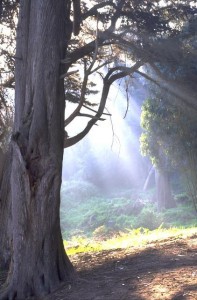I would maintain that thanks are the highest form of thought;
and that gratitude is happiness doubled by wonder.
–G.K. Chesterton
 Although Thanksgiving appears to be a uniquely American holiday, the mood of late November in the northern hemisphere feels hectic, festive, familyish—and it sometimes can feel dark. Very few holidays are not based in some way on seasonal or pagan rituals—whether they are secular, as is Thanksgiving, or religious. In northern climates (in days long ago), this might be the last time you could see families and friends till spring. In agricultural civilizations, it’s the celebration of the end of harvest. It’s okay to feast now; by February there may be very little left. Nowadays we don’t have that worry; instead the anxiety has crept inwards, and emerges as family-related issues: passionate reunions, guilt, or nostalgia. This time of year can be fraught with tension, excitement, friendliness, food, warmth, light, depression, and so on.
Although Thanksgiving appears to be a uniquely American holiday, the mood of late November in the northern hemisphere feels hectic, festive, familyish—and it sometimes can feel dark. Very few holidays are not based in some way on seasonal or pagan rituals—whether they are secular, as is Thanksgiving, or religious. In northern climates (in days long ago), this might be the last time you could see families and friends till spring. In agricultural civilizations, it’s the celebration of the end of harvest. It’s okay to feast now; by February there may be very little left. Nowadays we don’t have that worry; instead the anxiety has crept inwards, and emerges as family-related issues: passionate reunions, guilt, or nostalgia. This time of year can be fraught with tension, excitement, friendliness, food, warmth, light, depression, and so on.
I was eighteen when I first moved to the United States after having lived abroad since I was two. Experiencing my first Thanksgiving here, I was cynical. Like the dubious celebration of Guy Fawkes Day in England, Thanksgiving seemed historical propaganda with little resonance of either spirit or nature. My cynicism increased over the years: with so many starving people in the world, to overeat seemed gross. To slaughter millions of turkeys on one day felt like a bloodbath. Family tensions, hurt feelings, exhausting travel, hours of watching football on television … ugh ugh ugh.
As my children grew up, I emphasized the harvest festival aspect of Thanksgiving, making it a universal theme rather than distinctly American. It was a pleasant opportunity to see grandparents. It was fun to cook together. Having grown up in many countries around the world, I introduced un-traditional traditions. Greek dolmades. Delicious Italian vegetarian lasagna. Home-made sushi made by my son when he was working at a Japanese restaurant. Baked curry tofu made by my vegetarian daughter. We nodded to the Massachusetts tradition of squash and cranberries, but more because these were local to our state than because they were a tradition. I was always trying to make our holidays global.
Then one day I was browsing in our local library and found a children’s book about the first Thanksgiving. As I read it, I was struck by revelation. Whether or not this story actually happened doesn’t matter, because it’s ‘true’ in the real sense of the word. This is what I learned: Planning for the first Thanksgiving was contentious. Tables were set up, banquet-style, along the main street, and the food was—at last—abundant and delicious. However, no celebration could take place without first saying prayers, giving thanks, and offering a grace. Many of the pilgrims had made the decision to leave their homes and loved ones far across the sea in order to find a place where they could worship freely. Religion mattered deeply to them. But unfortunately there were several different religions represented by those pilgrims who had survived their first year in New England.
 According to the history I read, they began to bicker about the form of prayer, and then to argue vehemently. The arguments escalated, and it looked as though the feast that was planned would be tainted by the very quality the pilgrims had sought to leave behind: intolerance for another’s right to worship as one pleased.
According to the history I read, they began to bicker about the form of prayer, and then to argue vehemently. The arguments escalated, and it looked as though the feast that was planned would be tainted by the very quality the pilgrims had sought to leave behind: intolerance for another’s right to worship as one pleased.
The contentious meetings were resolved this way: the wise elders of the small Plymouth colony like William Bradford and Edward Winslow declared that every person or family would go inside their own houses and worship privately. Only then would they emerge and the feasting and partying would be done together.
Now, to me, Thanksgiving is one of the loveliest of all American traditions. Not to neglect the spirituality, the seasonal significance, and the reverence of a holiday, but to choose it independently, to practice it privately, and then to rejoice together, with family and friends.
WriteSpa #79—Thank You
One thing I know about this time of year: most of us are too busy to write anything coherent.
So, try this: the last thing at night before you turn off your light or first thing in the morning before you turn it on, write a list titled “Thank you.”
Thank you for …. it’s another way of counting blessings. Be surreal though, too, in this exercise. Surprise yourself. Thank yourself for things that you think you’re not grateful for; like a leaky faucet (that brings mindfulness) or an angry telephone call (that let’s your own anger flow out, instead of being pent up inside). These are all unseen guests from beyond—don’t assume you already know why an annoyance or sadness has come into your life. Greet them all—welcome them all in, at this thanksgiving time.
If the only prayer you said in your whole life was “thank you,” that would suffice.
–Meister Eckhart
